Regular health check-ups are crucial in maintaining your child’s well-being and ensuring optimal growth and development. While parents often focus on immediate health concerns, scheduling a yearly physical for your child offers a comprehensive evaluation of their overall health and provides valuable insights for preventive care.
Monitoring Growth and Development
Children go through rapid growth and development, both physically and emotionally. A yearly physical allows healthcare providers to track your child’s height, weight, and other key measurements.
Detecting Potential Health Issues
Yearly physicals provide an opportunity to detect potential health issues before they escalate. Routine screenings can catch problems such as vision and hearing impairments, high blood pressure, diabetes, and developmental delays. Identifying these issues early allows for timely intervention, reducing the impact on your child’s health and quality of life.
Vaccination Updates
Immunizations are a cornerstone of pediatric care. Yearly physicals ensure your child’s vaccinations are up to date, protecting them from preventable diseases. Maintaining a vaccination schedule safeguards your child’s health and contributes to community immunity, preventing the spread of contagious illnesses.
Establishing Healthy Habits
Regular physicals offer an opportunity to discuss your child’s lifestyle, including nutrition, physical activity, and sleep habits. Healthcare providers can provide guidance on maintaining a balanced diet, engaging in appropriate exercise, and establishing healthy sleep routines.
Emotional and Mental Health Assessment
Physical health is intertwined with emotional and mental well-being. Pediatricians use annual check-ups to assess your child’s emotional development, behavior, and mental health. Early detection of anxiety, depression, or behavioral challenges allows timely intervention and support.
Building a Relationship with Healthcare Providers
Frequent visits to the same healthcare provider establish a rapport between your child and their doctor. This relationship fosters trust and comfort, making it easier for your child to communicate about their health concerns. Regular check-ups allow healthcare providers to understand your child’s medical history, enabling personalized care.
Preventive Care
Prevention is a cornerstone of pediatric medicine. Yearly physicals provide a platform for healthcare providers to discuss age-appropriate preventive care measures, such as dental hygiene, sun protection, and safety measures.
Educational Opportunity
Yearly physicals are not just for medical assessment but also for educational opportunities for parents and children. Healthcare providers can share information on growth milestones, age-appropriate nutrition, and safety measures. Parents can ask questions and gain valuable insights into their child’s health and development.
A yearly physical is more than just a routine check-up; it’s an investment in your child’s health and future. Regular visits to a healthcare provider enable early detection of potential health issues, provide a platform for discussions on healthy habits, and foster a positive relationship with medical professionals. By prioritizing yearly physicals, you empower your child to grow up healthy, confident, and equipped with the knowledge to make informed decisions about their well-being.
